Food cravings and aversions are very common during pregnancy. As a pediatric registered dietitian, nutrition and food safety for moms-to-be is my specialty! In this post, I share what some common pregnancy cravings and food aversions are, when they start, why they happen, and what’s perfectly normal!

About 75% of women say that they have some sort of craving during pregnancy, and again, scientists aren’t really sure why. Some suspect that women crave foods that contain nutrients that their body is lacking—so if you’re low in calcium, you may crave dairy foods. But there’s no real evidence to support this.
Some people crave really nutritious foods, while others have more indulgent desires. Of course, it’s fine to give in to cravings, as long as the foods are safe to eat while pregnant (e.g. no raw meat, or soft cheese) and you eat intuitively (according to your physical hunger, fullness and satisfaction. Here’s a post on what you cannot eat during pregnancy, if you’re interested!
During pregnancy, it’s important that you focus on nutrient-dense foods primarily, so as long as highly processed or foods nutrient-poor foods don’t displace nutrient-dense foods (fruit, veggies, meat, fish, beans, lentils, nuts, seeds, dairy etc), enjoying what you crave is totally fine. Because pregnancy nutrition can be confusing and overwhelming, I’ve created a guide to pregnancy nutrition, and I’ve also co-authored a book that walks you through every stage of pregnancy, and what you need food and nutrition wise before, during and after to support yourself and your growing baby here: Food to Grow On: The Ultimate Guide to Childhood Nutrition, From Pregnancy to Packed Lunches.
In this post, I’m going to cover:
- Why food aversions and cravings may serve a purpose
- What causes food cravings during pregnancy
- When pregnancy cravings start
- Common food cravings during pregnancy
- Common food aversions during pregnancy
- What causes food aversions
- Food aversions in the first trimester
- Food aversions in the second trimester
- What to do if every food is turning you off
- Tips to cope with food aversions during pregnancy
- What to expect with morning sickness
- Tips to reduce pregnancy-related nausea
Food Aversions and Cravings May Serve a Purpose!
There’s also some speculation that food aversions may serve a protective purpose, perhaps preventing you from eating foods that could make you sick or a combination of nutrients that’s not right for your body. Again, this is only a theory—more research is needed. Cravings during pregnancy may not necessarily be related to pregnancy though. It could be a sign that your blood sugar levels are out of balance, especially if you’re consuming a lot of highly processed carbohydrate foods and not eating enough satiating foods that contain protein, dietary fat or dietary fibre. Something to consider!
There is no one-size fits all solution to food cravings or aversions during pregnancy. Unfortunately, we’re not really 100% sure why these happen, and there may be several factors at play. It’s important to eat intuitively and it’s ok to avoid foods that turn you off or gravitate towards foods that you crave, as long as you’re receiving the proper nutrition for a healthy pregnancy. For the most part, cravings and aversions are nothing to fear and not a sign that anything is wrong.
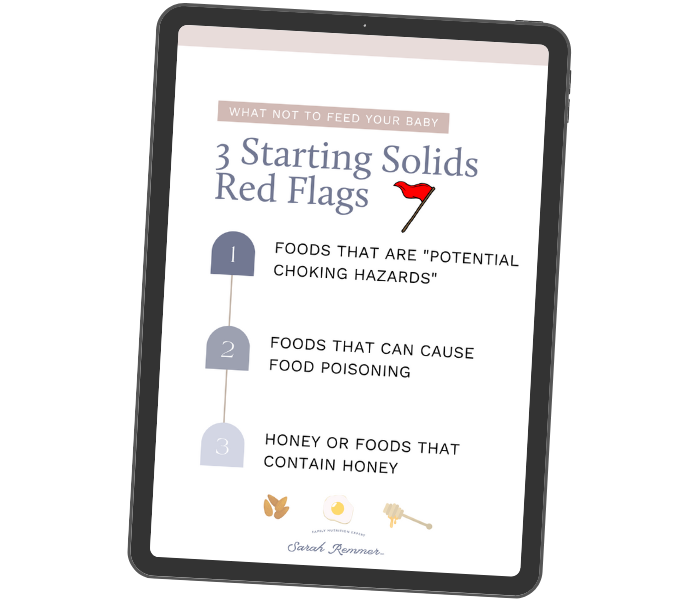
Starting solids? Don’t panic.
Starting solids is an exciting milestone in your baby’s life, but it can also be confusing, especially when you’re overloaded with conflicting information on how and when to do it. Download your free guide to starting solids and clear the confusion!
What causes food cravings?
Food cravings tend to be different for every expectant mom. While some crave sweet foods like ice cream, fruit, cereal or yogurt, others crave salty foods like chips, olives or pickles. And then some actually crave both sweet and salty (like me!). There actually has been quite a bit of research conducted on why food cravings happen, and it turns out that there are many possible reasons. For example, food cravings might be due to hormonal changes, a heightened sense of taste and smell during pregnancy, or even nutrient deficiencies. And then there are food cravings that can occur out of nostalgia or for no particular reason at all!
When do pregnancy cravings start?
The answer to this is different for everyone, but typically, food cravings seem to start at the end of the first trimester, peek during the second trimester and then lessen throughout the 3rd trimester. Food cravings may change rapidly, and you may find yourself craving something different every few days. This is normal! Most food cravings will go away after your baby is born, but it is possible for cravings to linger after delivery. Breastfeeding moms tend to report that they notice their food cravings do linger until they wean.
Common food cravings during pregnancy:
Craving ice during pregnancy:
You’re certainly not alone if you crave ice during pregnancy–it’s actually really common! An intense desire to crunch on ice during pregnancy is considered a form of pica. Pica is a term used to describe the craving for non-food items such as clay or dirt and is usually caused by some sort of nutrition deficiency. Some studies show that an ice craving is also a sign of low iron and early stages of anemia (low iron levels). Although it’s not an unhealthy craving, it’s worth mentioning it to your doctor or prenatal dietitian in case it IS a sign of anemia or another nutrient deficiency. Also, if it’s lasts a while, it can put some wear and tear or your teeth and gums. If you have this craving, make sure that you’re prioritizing nutrient dense foods during pregnancy and getting enough iron in your diet.
Craving Spicy food during pregnancy:
There are a few possible reasons why you might crave spicy foods during pregnancy. First, during pregnancy, your immune is compromised, and it’s actually quite common to crave spicy foods when your immune system is down. Another possible reason is that during pregnancy, your senses can be drastically impacted (either blunted or heightened) due to hormonal changed. So certain spicy foods that are typically too hot to handle might be really pleasing and delicious to you during pregnancy. Luckily, spicy foods are totally safe during pregnancy. Spicy foods, on the other hand, CAN cause or exacerbate pregnancy-related digestive issues like heartburn and nausea. So if you’re consuming a lot of jalapeño peppers, or spices such as cumin or cayenne and you’re noticing unpleasant gastrointestinal side affects, that might be why (or even part of the reason why)!
Craving fast food or salty foods during pregnancy:
Many women (including myself!) crave greasy, salty fast foods at some point during their pregnancy. Try not to over-analyze this, as it’s also normal to now and then crave these foods when you’re not pregnant – totally normal and ok! It could be because you’re craving comfort foods, or because your senses are out of whack due to hormonal shifts. And I’m here to tell you that it’s also ok to listen to your body and indulge in these foods when the cravings arise. As mentioned previously, it’s important to prioritize nutrient-dense whole foods during pregnancy, so as long as these foods don’t dominate your diet, you’re good to go.
Craving fruit during pregnancy
If you’ve got a serious hankering for fruit during pregnancy, you’re definitely not alone. This could be due to many things, but most likely because of hormonal shifts which can cause your sense of taste to either be heightened or blunted. And craving fresh fruit is not a bad thing! It’s a great thing actually! Fruits are rich in vitamins, minerals, antioxidants and dietary fibre and they can help you to stay hydrated! When you do consume fruit, a recommend that you always pair it with some protein in order to keep your blood sugar and energy levels stable (and also help to keep you satiated after your meal or snack).
Craving cheese and dairy during pregnancy
Craving cheese like crazy? You’re not the only one! Similar to ice cream, cheese is a common pregnancy craving. This could be because your body is needing more calcium, which is an important mineral that we get through food (like dairy!) that helps to keep our bones and teeth healthy. So, this craving isn’t bad one! Hard cheeses in particular are nutrient-packed with not only calcium, but also protein, Vitamin D, magnesium and phosphorous. All of which are key nutrients for baby’s growth and development and your bone health too. Remember to be careful with cheese though – choose a pasteurized version so that you protect yourself from food-borne illness. Most cheeses in North America are pasteurized, but it’s better to always check before consuming just in case.
Craving red meat during pregnancy
I remember when I was pregnant with my first, I all of a sudden had an intense craving for red meat (something that I did not consume regularly at all). My friends and family thought it was funny and I found it so interesting! It turns out I’m not the only one, and that craving red meat is fairly normal! This is likely due to our bodies needing more dietary iron during pregnancy, which red meat is rich in. Red meat is also safe, nutritious (it also contains protein, zinc, Vitamin B 12 etc.) and recommended to be consumed during pregnancy. Enjoy it when you feel like it, and just make sure that you cook it until it has an internal temperature of at least 145 F. Other source of iron include fish, beans, lentils, poultry, eggs, and spinach!
Craving peanut butter in pregnancy
Luckily, peanut butter is yet another craving that you don’t have to fear. It’s loaded full of nutrition, and let’s be honest… is delicious! It’s also an easy and convenient way to get more protein, plant-based fat, fibre and vitamins and minerals (all important for pregnancy). This craving may stem from the hormonal changes during pregnancy, but more research is needed. It is totally safe during pregnancy (unless of course you’re allergic), and can be a nutritious addition to any snack or meal. Pair peanut butter with fruit and crackers for a balanced snack, or add it to a fruit smoothie for more staying power (peanut butter contains both protein and fat which help to keep blood sugars and energy levels stable). Other nut and seed butters (almond, cashew, pumpkin seed etc.) are great during pregnancy too!
What are food aversions during pregnancy?
There may be certain smells or flavors that turn your stomach when you’re pregnant—and often they are foods you used to love (unfortunately). Common food aversions are to strong flavors, such as garlic, onions, spices, and coffee. That being said, I had a serious aversion to chicken during all three of my pregnancies, a food that isn’t particularly strong tasting at all! But if you can’t stand the taste or smell of certain foods, simply avoid them. Know that it’s totally normal and common, and it will pass! Basically, I food aversion is a strong desire to avoid (and not consume) a certain food. The sight or smell of it might even make you feel sick! If you feel that food aversions are limiting your nutrition or impacting your health or weight during pregnancy, make sure that you seek personalized support from your doctor, midwife or dietitian.
As mentioned above, food aversions during pregnancy often go hand-in-hand with pregnancy-related nausea, something that is quite common, especially in the first trimester!

What causes food aversions during pregnancy?
As mentioned above, there is no concrete answer to this because there’s a lack of research. Some experts speculate that food aversions are related hormonal changes that happen during pregnancy, specifically the steep rise in the Human Chorionic Gonadotropin (hCG) in the first trimester. The link between the two is thought to be because food cravings and nausea tend to be most predominant during the beginning part of the pregnancy (first trimester), and the amount of hCG doubles every few days in that first trimester, peeking at week 11. Again, more research is needed, and it’s important to note that nausea and food aversions can occur at any point during your pregnancy (and even after), not just the first few months.
Pregnancy food aversions in first trimester
Food aversions tend to be most noticeable and heightened during the first trimester of pregnancy. This tends to be when morning sickness and nausea are at their peek too, which makes sense given the connection between the two. Morning sickness (which can, by the way, happen at any time of the day), paired with possibly heightened sense of taste or smell can be the perfect storm for food aversions in the early weeks of pregnancy. My advice? To really listen and tune into your body and avoid those foods that are turning you off. Stick with foods that you are craving and taste good to you, and consider eating smaller more frequent meals and snacks rather than larger more spread-apart meals. Consider chatting with your healthcare provider about switching your prenatal multivitamin if you think that may be contributing to the nausea too.
Pregnancy food aversions in second trimester
Food aversions may carry over to the 2nd trimester of pregnancy, or may even randomly pop up at this time. Both totally normal. It’s still really important to listen to your body and steer towards foods that you’re craving and that make you feel well. There’s no point in forcing yourself to eat something that turns you off (you might end up eating less than you should!). Make sure that you have balance in your meals and snacks (some protein, fruit/vegetable and whole grain or starch) and aim for some variety everyday. Make sure to give yourself several opportunities to eat during the day and have grab-n-go snacks that are appealing to you too.
Food aversions to everything during pregnancy
If you’re finding that every food (or most foods) are turning you off, you may want to speak to a prenatal registered dietitian to come up with a plan to ensure that you’re eating enough variety and nutrition throughout your pregnancy. You may be dealing with some severe pregnancy-related nausea or even something called hyperemesis gravidarum, which is a potentially life-threatening disease in pregnancy that may cause weight loss, malnutrition, dehydration, and debility due to severe nausea and/or vomiting, and may even cause long-term health issues for mom and baby. If you think this is the case, you should definitely contact your pregnancy healthcare provider to ensure that you and your baby stay nourished and hydrated.
How should I cope with food aversions during pregnancy?
In most cases, it’s best to not fight the food aversions, but to lean in it and accept that this is likely temporary, and that it’s ok and normal. It’s important to remember that foods are vehicles for the nutrients that you need for pregnancy and that you can get those nutrients from other foods too. For example, you can get iron from red meat but you can ALSO get iron from chicken, eggs, fish, spinach, beans and pumpkin seeds. As long as you’re focusing on balance and variety, and eating intuitively (listening to your body), you’re likely getting the nutrition you need. Try not to stress about your food aversions or over-analyze them, because they are totally normal and there are so many different factors at play that it’s hard to pin-point the exact reason. Focus on foods that appeal to you, as well as on making sure that you have lots of variety and balance. Try to give yourself eating opportunities every 2-3 hours and consider smaller more frequent meals and snacks, especially if you’re experiencing morning sickness and nausea. Don’t forget to take your prenatal multivitamin and mineral, stay hydrated and get lots of rest too.
What is nausea or morning sickness during pregnancy?
Nausea and morning sickness (which isn’t necessarily only restricted to the “morning”) typically occur during the first trimester, and for many women, they are one of the first signs of pregnancy! Symptoms typically appear around the sixth week of pregnancy and generally disappear around the end of the first trimester (but not always). More than half of women experience morning sickness, with the severity ranging from slight queasiness to excessive vomiting, something known as hyperemesis gravidarum.
Some women are ill only in the morning, some women feel sick all day long, and others may feel sick only in the evening. While you are feeling nauseous it can be difficult to eat enough food to receive the calories and nutrients you need to stay nourished throughout your pregnancy.
Tips to reduce pregnancy-related nausea:
Include protein in every meal and snack.
The sight or smell of meat can trigger nausea in many pregnant women, but eating enough protein can actually help keep that queasiness away. If meat isn’t your thing, there are many non-meat sources of protein to help you meet your needs. Things like beans, lentils, tofu, dairy foods like milk, Greek yogurt or cheese, eggs, nuts (including nut butters), and seeds are all good sources of protein. Make sure to include at least a little bit in each meal and snack. Having a high-protein snack before bed can also prevent the sick feeling associated with an empty stomach in the morning. Speaking of which, here are the best foods for a healthy pregnancy.
Don’t let yourself get too hungry.
Eating every two to three hours can help your blood sugar levels stay stable and help you feel full, especially if you’re including foods rich in protein and fibre. An empty stomach can trigger nausea. My favourite snacks were apple slices and peanut butter, hummus and whole grain crackers and veggies, homemade trail mix or protein-rich muffins or energy bites. Even a quality bar such as Made with Local’s Real Food Bars can do the trick!
Give into cravings—within reason.
If you crave a certain food, chances are it will sit well with you and not make you feel nauseous. Eating even just a small serving can help alleviate the queasiness long enough to eat a nutritious meal.

Consider switching your prenatal multivitamin.
Many women find that the supplement form of iron (and even folate) in their prenatal multivitamin can cause nausea. You can ask your doctor or midwife for a different brand of prenatal multivitamin or for a chewable or liquid alternative. Take your supplements with food and not on an empty stomach, or try taking them right at bedtime.
Keep a light snack beside your bed.
If you’re experiencing a lot of morning sickness, before getting out of bed in the morning have a quick bite of something light. Soda crackers are a really popular option because they’re neutral tasting and a bit salty.
Consider trying ginger.
It’s an age-old remedy, but this one is backed by science too, especially during the first trimester. Ginger really can reduce nausea and vomiting in pregnancy! You can slice some fresh ginger into a mug and pour boiling water over it—you’ve just made ginger tea, or try homemade ginger cookies or ginger loaf, or even crystallized ginger. You can use ginger in any your cooking or baking—stir-fries, muffins, fruit salad, etc.
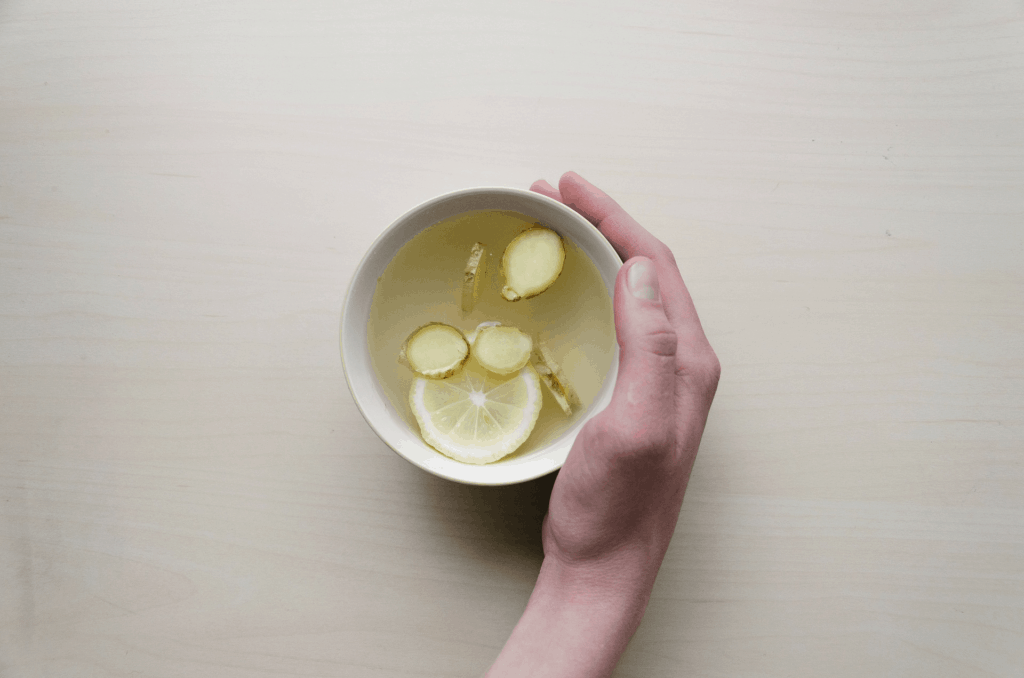
Try drinking fluids before or after meals, instead of with meals.
And sip throughout the day so you don’t get dehydrated, especially when you are vomiting. If you find it hard to drink enough water, try adding natural flavouring such as fresh or frozen fruit, cucumber slices or a squeeze some lemon or lime in!
FAQ
Researchers have examined the link between the first occurrences of nausea, vomiting, food cravings, and food aversions during pregnancy and found a significant positive correlation between them. Interestingly, 60% of women reporting both nausea and food aversions said that the first occurrence of each happened in the same week of pregnancy. What does that mean? You may be turned off by foods that made you feel queasy. Makes sense, right?! More on pregnancy-related nausea below.
Typically, food aversions, start at the beginning of your pregnancy or within the first few months (the first trimester), but everyone is different and they can happen anytime throughout your pregnancy. Most of the time, food aversions tend to dissipate as your pregnancy progresses, and disappear when baby is born.
This is different for everybody. They will often peek around the end of the first trimester and dissipate from there, lessening as the weeks go by. But again, everyone every pregnancy is unique. You might not experience any food aversions at all, but they may last throughout your entire pregnancy.
Bottom line on food aversions:
You’re not alone if you are experiencing pregnancy-related food aversions or food cravings, and they are not to be feared. And although they are quite common, we really don’t know 100% why yet! Whether they are tied to hormone shifts, increased energy needs, or because your body is telling you that it needs particular nutrients, we’re not sure. Regardless, there are a few things you can do to control cravings, manage pregnancy-related nausea (which often goes part and parcel with cravings and aversions) such as including a little bit of protein in each meal and snack.
If you’re experiencing extreme nausea and vomiting or feel as though you’re not gaining the appropriate amount of weight, talk to your doctor about it and consider seeking help from a prenatal dietitian.
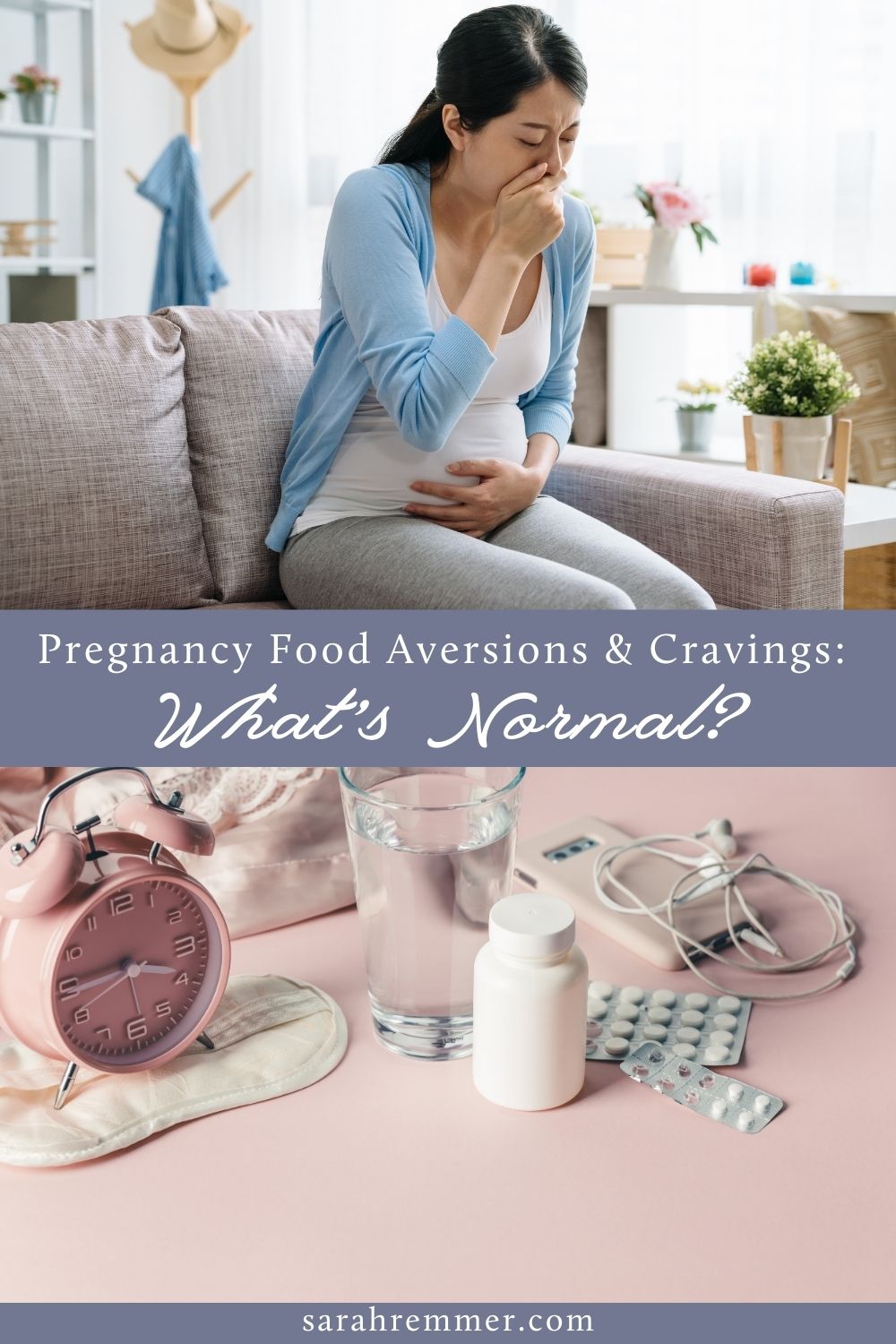




![[AD] It’s Day 6 of my 15-Minute Supper Series and today we’re putting a delicious twist on a classic BLT to make it nourishing and meal-worthy 🤤
Make sure to comment “Spud” and I’ll send you my top dietitian tips for feeding your family on busy weeknights along with a huge list of meal ideas!
This pasta salad takes no time at all to throw together and has everything you need for a nourishing meal. I always make extra bacon for things like this, but if you don’t have any cooked bacon I find cooking it in the airfryer or stovetop the quickest 🥓
I find that this salad lasts 2-3 days in the fridge without getting too soggy. You can also add in fresh lettuce to crisp it up or add the dressing when you eat it.
I ordered all of my groceries from @spuddelivers, which always saves me time and effort and gives me peace of mind knowing that I’m using high-quality, local and sustainable ingredients. I love that they come straight to my door the day after ordering 🙌🏻
Let’s make it!
Ingredients:
* 10 slices bacon cooked and diced
* 12 ounces pasta cooked and cooled
* 1 cup homemade Ranch dressing
* 1 ½ cup baby tomatoes diced
* ½ avocado diced
* feta
* ⅓ cup red onion diced
* 1 cup romaine lettuce
* fresh parsley for garnish optional
Homemade ranch dressing:
* ¾ cup mayonnaise
* ½ cup sour cream or Greek yogurt
* ½ teaspoon dried chives
* ½ teaspoon dried parsley
* ½ teaspoon dried dill weed
* ¼ teaspoon garlic powder
* ¼ teaspoon onion powder
* Salt and pepper to taste
Make it:
1. Blend all Ranch dressing ingredients together in a small blender (or whisk by hand) and set aside.
2. In a large bowl assemble the pasta, tomatoes, avocado, cheese, red onion, lettuce and bacon.
3. Pour the dressing over and toss to combine.
4. Garnish with parsley and serve.
You are going to LOVE this meal-worthy salad, I promise!
Comment SPUD to receive my top dietitian-approved tips for feeding your family during the week, a long list of ideas, and a curated shopping list with all of the ingredients for this recipe + all of the other ideas that I share in this resource!
#sponsored #spuddelivers #15minutemeals #whatsfordinner #easymealideas #dietitianapproved](https://www.sarahremmer.com/wp-content/uploads/sb-instagram-feed-images/438745920_798281295514125_2547899647147267180_nfull.jpg)

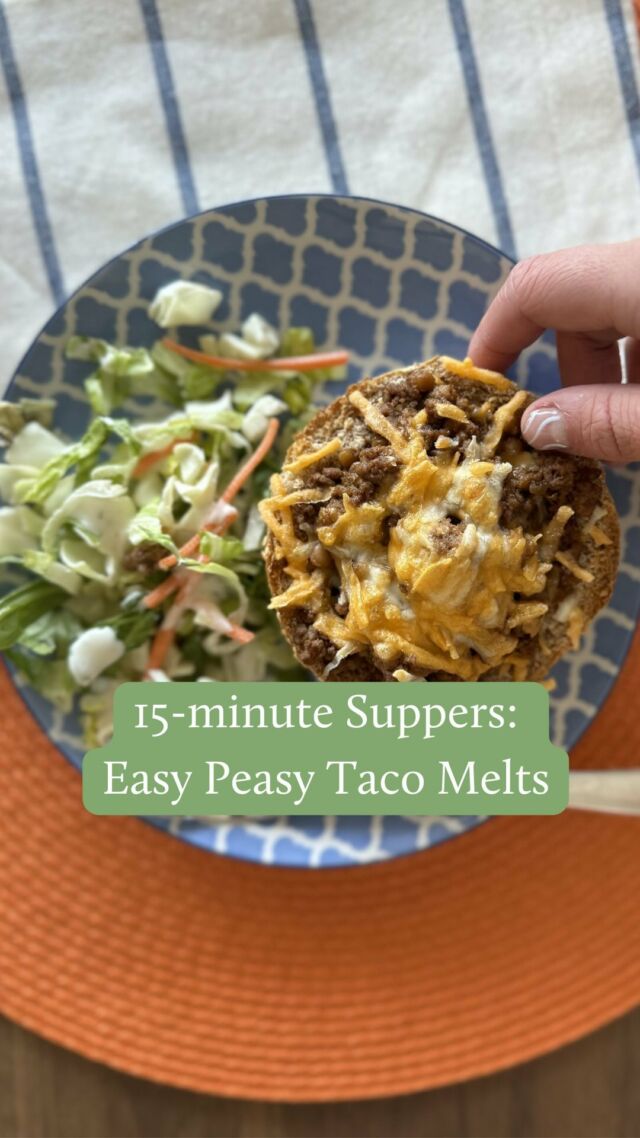
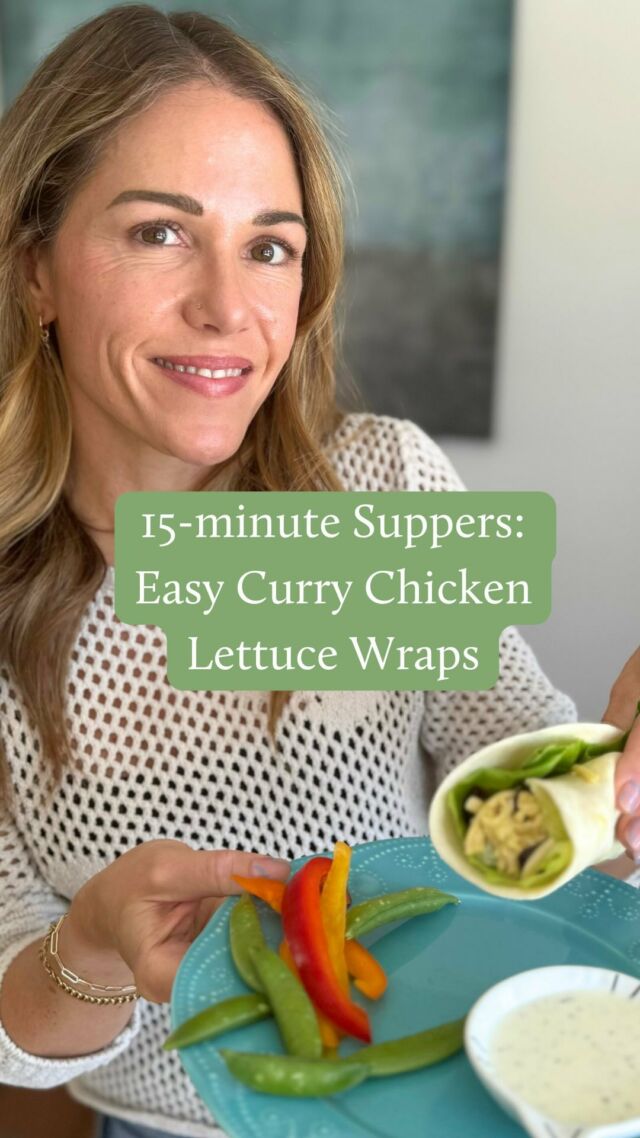
Leave a Comment